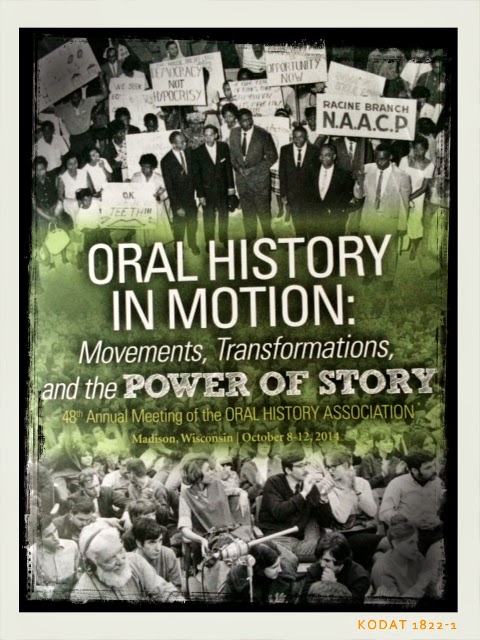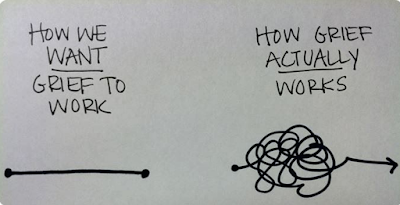Art of Memory: Samuel Beckett
Comments I made at a panel on Beckett March 5, 2015.....
If there is one Irish writer whom you do not normally associate with memory, it would have to be Samuel Beckett. Often portrayed as the "artist from nowhere," and as having an imagination situated somehow "outside of history," Beckett the man and Beckett the writer were almost obsessively forward-looking. Exploding categories, questioning identities, accommodating chaos. Looking back? Nah. Except Beckett insisted he could remember being in utero. Yup. And he didn't like it one bit.
Seems that for Sam, suffering started early. He claimed, "It was an existence where there was no voice, no movement that could free me from the agony and darkness I was subjected to."
Bitingly funny, absurd and deeply engaged in the struggle to portray the gaps between our experience/desires and our ability to use language to express them, Beckett gets pegged as the least Irish of the Irish writers, the most derisive of the tropes of a Gaelic, Celtic Ireland celebrated by the Literary Revivalists. Leaning towards the abstract, Beckett rejected representations in his work, and if he portrayed the Irish at all, he took aim at conventional idealized representations of Irishness.
Beckett was born in the Foxrock suburb of Dublin in 1906. His family was solidly middle class, of the Protestant business class --- not to be confused with the landed Anglo-Irish gentry class to which many Protestant revivalists belonged, including Yeats, Lady Gregory and Synge. He lived in a world as a child where it was possible not to interact with Catholics, where "if one preferred to think of oneself as English there was no real reason not to." But at the same time, he would not had had the same social anxieties as members of the Protestant Irish upper class. There was less to lose and perhaps more to gain from Irish independence or home rule for his family and families like his. He was sent up to Eniskillen to prep school -- in county Fermanagh, which was soon to become a part of Northern Ireland.
So Beckett's cultural geography and sense of place was vagabond from an early age.
As George Fleming recalled, "One never really did know where one would find Sam. Since Trinity he had been vaguely, almost deliberately rootless. He had produced what some of us thought a really brilliant book on Dublin and had then disappeared to Paris, where he was said to be working as a kind of secretary to James Joyce and translating Finnegan's Wake [sic] into French - or, as some other versions had it, into English. And yet he would suddenly be seen again in Dublin, and when asked why, would answer: "But I live here." He would turn into the Palace, or more likely, some quieter pub, and drink two pints with one in almost utter silence. Next time, it might be London that one ran across him, and he would still say: "But I live here."
 Sean Kennedy observes of Beckett, "Deliberately without roots, he situated himself in oblique relation to his own personal and cultural history." A citizen of Ireland all of his life, he was a resident of Paris since 1937. Beckett joined the French resistance, settling in the occupied region of France after Paris fell.
Sean Kennedy observes of Beckett, "Deliberately without roots, he situated himself in oblique relation to his own personal and cultural history." A citizen of Ireland all of his life, he was a resident of Paris since 1937. Beckett joined the French resistance, settling in the occupied region of France after Paris fell.
The obliquity could be pleasing to the Irish. Once, Beckett was rhetorically asked (so, told) by a French journalist, who was trying to confirm his Britishness, "Vous êtes anglais. His response? "Au contraire." As Mary Lydon points out, he is not asserting. He is not negating. Irishness appears as its own --- in all its in-betweenness.
It has been said that he edited and edited and edited, erasing all signs of Irishness in language, connotation, inference. History did shape Beckett's work, though not in a way you might think. He was deeply engaged with historical issues. Seán Kennedy's argument that for Beckett, that "accommodating chaos was a response to culture and history he encounterred in Germany and the totalizing logic of German fascist historiography" is fascinating. Perhaps his confrontation with Nazi historiography led Beckett to use the idea of forgetting, of countering memory, to, as Kennedy puts it, indict a "a country that has allowed a restrictive national imaginary to crowd out other possible modes of becoming." Beckett's overall disavowal of history and the archive -- of chronology, contingency, the notion of recovery and preservation of the past, was an active, not a passive process.
So, while we rightly embrace Beckett as a second-generation modernist and a man without a country, it is important that we remember that he was at the same time, shaped and influenced by Ireland, by memory, by history.
For more, See Seán Kennedy, "Samuel Beckett Today / Aujourd'hui" Vol. 15, Historicising Beckett / Issues of Performance / Beckett dans l'histoire / En jouant Beckett (2005), pp. 21-27
If there is one Irish writer whom you do not normally associate with memory, it would have to be Samuel Beckett. Often portrayed as the "artist from nowhere," and as having an imagination situated somehow "outside of history," Beckett the man and Beckett the writer were almost obsessively forward-looking. Exploding categories, questioning identities, accommodating chaos. Looking back? Nah. Except Beckett insisted he could remember being in utero. Yup. And he didn't like it one bit.
Seems that for Sam, suffering started early. He claimed, "It was an existence where there was no voice, no movement that could free me from the agony and darkness I was subjected to."
Bitingly funny, absurd and deeply engaged in the struggle to portray the gaps between our experience/desires and our ability to use language to express them, Beckett gets pegged as the least Irish of the Irish writers, the most derisive of the tropes of a Gaelic, Celtic Ireland celebrated by the Literary Revivalists. Leaning towards the abstract, Beckett rejected representations in his work, and if he portrayed the Irish at all, he took aim at conventional idealized representations of Irishness.
So Beckett's cultural geography and sense of place was vagabond from an early age.
As George Fleming recalled, "One never really did know where one would find Sam. Since Trinity he had been vaguely, almost deliberately rootless. He had produced what some of us thought a really brilliant book on Dublin and had then disappeared to Paris, where he was said to be working as a kind of secretary to James Joyce and translating Finnegan's Wake [sic] into French - or, as some other versions had it, into English. And yet he would suddenly be seen again in Dublin, and when asked why, would answer: "But I live here." He would turn into the Palace, or more likely, some quieter pub, and drink two pints with one in almost utter silence. Next time, it might be London that one ran across him, and he would still say: "But I live here."
 Sean Kennedy observes of Beckett, "Deliberately without roots, he situated himself in oblique relation to his own personal and cultural history." A citizen of Ireland all of his life, he was a resident of Paris since 1937. Beckett joined the French resistance, settling in the occupied region of France after Paris fell.
Sean Kennedy observes of Beckett, "Deliberately without roots, he situated himself in oblique relation to his own personal and cultural history." A citizen of Ireland all of his life, he was a resident of Paris since 1937. Beckett joined the French resistance, settling in the occupied region of France after Paris fell. The obliquity could be pleasing to the Irish. Once, Beckett was rhetorically asked (so, told) by a French journalist, who was trying to confirm his Britishness, "Vous êtes anglais. His response? "Au contraire." As Mary Lydon points out, he is not asserting. He is not negating. Irishness appears as its own --- in all its in-betweenness.
It has been said that he edited and edited and edited, erasing all signs of Irishness in language, connotation, inference. History did shape Beckett's work, though not in a way you might think. He was deeply engaged with historical issues. Seán Kennedy's argument that for Beckett, that "accommodating chaos was a response to culture and history he encounterred in Germany and the totalizing logic of German fascist historiography" is fascinating. Perhaps his confrontation with Nazi historiography led Beckett to use the idea of forgetting, of countering memory, to, as Kennedy puts it, indict a "a country that has allowed a restrictive national imaginary to crowd out other possible modes of becoming." Beckett's overall disavowal of history and the archive -- of chronology, contingency, the notion of recovery and preservation of the past, was an active, not a passive process.
So, while we rightly embrace Beckett as a second-generation modernist and a man without a country, it is important that we remember that he was at the same time, shaped and influenced by Ireland, by memory, by history.
For more, See Seán Kennedy, "Samuel Beckett Today / Aujourd'hui" Vol. 15, Historicising Beckett / Issues of Performance / Beckett dans l'histoire / En jouant Beckett (2005), pp. 21-27











Comments
Post a Comment